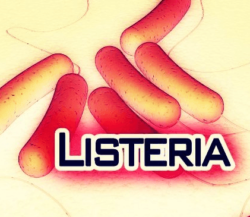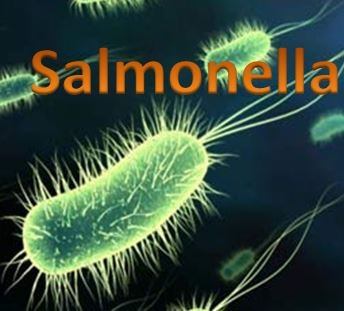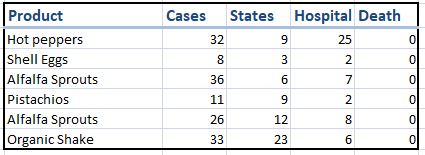Recalls and Outbreaks due to Food Pathogens: Is there a connection?
Most food recalls in the U.S. are due to Listeria
 Food Safety Tech has reported that in 2016 about 550 food products were recalled in the US. Of the recalled products, 275 were due to microbial contamination. Of the recalls, due to microbial contamination, 65% were due to Listeria monocytogenes. Salmonella accounted for 21% of the recalls, while E. coli accounted for only 3% of the recalls.
Food Safety Tech has reported that in 2016 about 550 food products were recalled in the US. Of the recalled products, 275 were due to microbial contamination. Of the recalls, due to microbial contamination, 65% were due to Listeria monocytogenes. Salmonella accounted for 21% of the recalls, while E. coli accounted for only 3% of the recalls.
As we reported, earlier this trend in continuing this year (More Recalls Caused by Fear of Listeria monocytogenes Contamination and In the last few days, (6/14-6/16) there have been several more recalls due to Listeria) with much more recalls due to Listeria.
CDC Outbreak reports
Listeria monocytogenes
2017: Listeriosis Linked to Soft Raw Milk Cheese Made by Vulto Creamery
Summary: Cases: 8, States: 4, Death: 2, Hospitalization: 8, Recall: yes
Cheese made by Vulto Creamery, from raw milk, was for sale at stores where at least seven of the ill people bought cheese before getting sick. Based on interviews with the sick people, all eight people ate a soft cheese. The ill resident of Florida reported traveling to New York State and eating soft cheese there before becoming ill.
2016:
Listeriosis Linked to Frozen Vegetables
Summary: Cases: 9, States: 4, Deaths: 3, Hospitalizations: 9, Recall: Yes
CRF Frozen Foods recalled 11 frozen vegetable products On April 23, 2016, due to potential contamination with Listeria. The recall was expanded On April 23, 2016, to include all organic and traditional frozen vegetable and fruit products processed in its Pasco, Washington. More than 350 consumer products (using 42 separate brands) were recalled, as well as at least 100 other products from other companies that contained recalled ingredients from CRF Frozen Foods.
Listeriosis Linked to Raw Milk Produced by Miller’s Organic Farm in Pennsylvania
Summary: Cases: 2, States: 2, Deaths: 1, Hospitalizations: 2, Recall: No
Listeriosis Linked to Packaged Salads Produced at Springfield, Ohio Dole Processing Facility
Summary: Cases: 19, States: 9, Deaths: 1, Hospitalizations: 19, Recall: Yes
The Ohio Department of Agriculture collected a Dole packaged salad from a retail location and isolated Listeria. Of the 14 ill people, 13 (93%) reported eating a packaged salad. Epidemiologic and laboratory evidence indicated that packaged salads produced at the Dole processing facility in Springfield, Ohio and sold under various brand names were the likely source of this outbreak.
Listeria Summary

Salmonella

2017: Human Salmonella Infections Linked to Live Poultry in Backyard Flocks,
Summary: Outbreaks: 8 Cases: 372, States: 47, Hospitalizations: 71, Recall: No
The dates covered are from January 4, 2017, to May 13, 2017. 36% of ill people are children younger than 5 years. 83% of the ill people had contact with live poultry in the week before illness started. In 2016 a record number of illnesses linked to backyard poultry were reported.
2016
Salmonella Anatum Infections Linked to Imported Hot Peppers — United States, May–July 2016
Thirty-two patients in nine states were identified with illness onsets from May 6–July 9, 2016. In this outbreak, the only food sample yielding Salmonella matching the outbreak strain was an Anaheim pepper. It was difficult to identify the pepper variety, especially when it was used as an ingredient. This outbreak also highlights new challenges in outbreak investigations when trying to reconcile epidemiologic data with WGS results
Multidrug-Resistant Salmonella Heidelberg Infections Linked to Contact with Dairy Bull Calves
Summary: Cases: 36, States: 10, Deaths: 0, Hospitalizations: 13
The illness report started from January 27, 2015, to January 16, 2017. 69% of the sick people interviewed reported contact with dairy bull calves or other cattle. WGS showed that isolates from ill people were closely related genetically to one another.
Salmonella Oranienburg Infections Linked to Good Earth Egg Company Shell Eggs
Summary: Case Count: 8, States: 3, Deaths: 0, Hospitalizations: 2, Recall: Yes
Good Earth Egg Company of Bonne Terre, Missouri recalled its shell eggs, on October 3, 2016, because of potential contamination with Salmonella. The eggs were distributed throughout the Midwest, including Missouri, Illinois, and Kansas. Illnesses commenced on April 23, 2016, and continued to August 24, 2016. Epidemiologic, laboratory, and traceback investigations identified shell eggs distributed by Good Earth Egg Company of Bonne Terre, Missouri as the likely source of this outbreak.
Salmonella Reading and Salmonella Abony Infections Linked to Alfalfa Sprouts
Summary: Cases: 36, States: 9, Deaths: 0, Hospitalizations: 7, Recall: Yes
Sprouts Extraordinaire recalled its alfalfa sprout products from the market on August 5, 2016, because of potential contamination with Salmonella. Epidemiologic, laboratory, and traceback investigations identified Sprouts Extraordinaire of Denver, CO as the likely source. 58% of the sick people reported eating alfalfa sprouts in the week before illness started.
Eight Multistate Outbreaks of Human Salmonella Infections Linked to Live Poultry in Backyard Flocks
Summary: Cases: 895, States: 48, Hospitalizations: 209, Death: 3
Similar to the outbreak reported for this year. Ill people reported purchasing live baby poultry from several suppliers, including feed supply stores, Internet sites, hatcheries, and friends in multiple states. Epidemiologic, traceback, and laboratory findings linked the eight outbreaks to contact with live poultry, such as chicks and ducklings, from multiple hatcheries.
Salmonella Montevideo and Salmonella Senftenberg Infections Linked to Wonderful Pistachios
Summary: Cases: 11, States: 9, Hospitalizations: 2, Death: 0 Recall: Yes
Wonderful Pistachios recalled a limited number of flavors and sizes of in-shell and shelled pistachios on March 9, 2016, because they may have been contaminated with Salmonella. WGS results showed that isolates of Salmonella Senftenberg from ill people were closely related genetically and that all 11 infections from both outbreak strains (S. Montevideo (9) and S. Senftenberg (2) ) were closely related genetically to the isolates found in samples of raw pistachios from Paramount Farms.
Salmonella Infections Linked to Alfalfa Sprouts from One Contaminated Seed Lot
Summary: Cases: 26, States: 12, Hospitalizations: 8, Death: 0 Recall: No
The Kansas Department of Health and Environment issued a warning on February 19, 2016, to consumers to not eat alfalfa sprouts produced by Sweetwater Farms. Sweetwater Farms withdrew all of its sprout products from the market on February 26, 2016. Even after the withdraw people infected with the outbreak strain of Salmonella Muenchen continued to be reported. The seed supplier contacted sprouters who received contaminated lot of seeds and asked that they return them.
Salmonella Virchow Infections Linked to Garden of Life RAW Meal Organic Shake & Meal Products
Summary: Cases: 33, States: 23, Hospitalizations: 6, Death: 0 Recall: Yes
Garden of Life, LLC recalled a limited quantity of its RAW Meal Organic Shake & Meal products available in chocolate, original, vanilla, and vanilla chai on January 29, 2016, because they had the potential to be contaminated with Salmonella Virchow.
Epidemiologic and laboratory evidence indicated that products made by Garden of Life were the likely source of this outbreak. The Utah Public Health Laboratory and Oklahoma Public Health Laboratory isolated the outbreak strain of Salmonella Virchow from open containers of Garden of Life RAW Meal. FDA sampling confirmed the presence of the outbreak strain of Salmonella Virchow in Organic Moringa Leaf powder used in RAW Meal Organic Shake & Meal Replacement.
Salmonella Summary

Recalls and Outbreaks
Comparing the recalls to the outbreaks there is a disproportionate number of recalls due to Listeria monocytogenes as compared with all other food pathogens. In the past year, there were more outbreaks related to Salmonella than Listeria. However, it is striking to see the difference in fatalities between the outbreaks of the two organisms. Listeria causes significantly more fatalities, and perhaps this is the justification for the frequent recalls.
